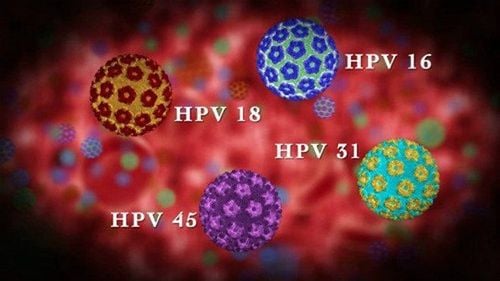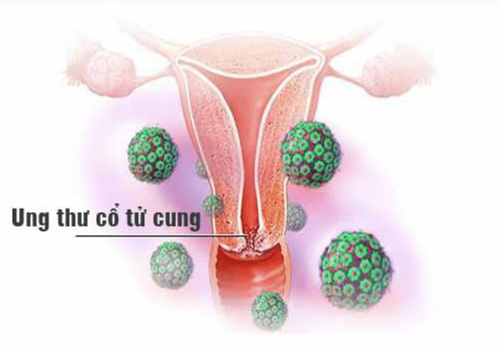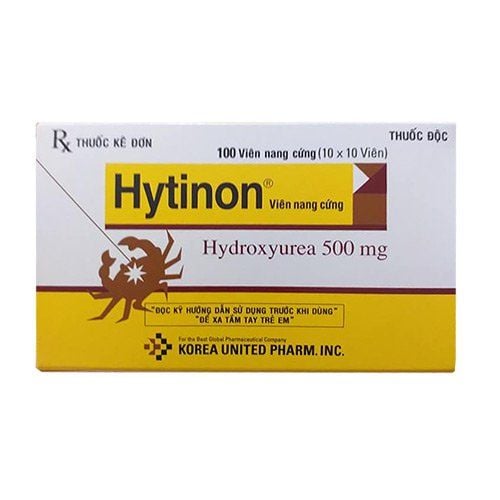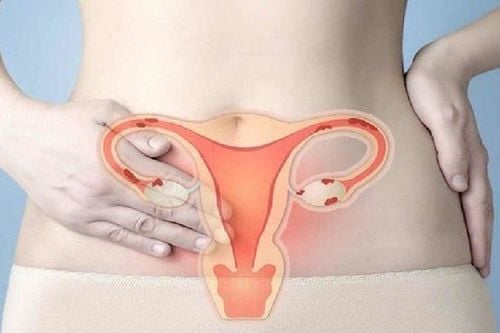This is an automatically translated article.
Posted by Master, Doctor Huynh Vu Khanh Linh - Doctor of Obstetrics and Gynecology - Department of Obstetrics and Gynecology - Vinmec Phu Quoc International General Hospital
Cervical cancer is the third most dangerous disease in the world in terms of mortality in women, after breast and ovarian cancer. However, now with modern diagnostic methods, cervical cancer can be screened very early with the HPV test and the PAP test, bringing many opportunities to women for treatment.
1. What is cervical cancer?
The cervix is the entrance to the uterus, which is part of the female reproductive organs. Accordingly, cancer cells can grow on the cervix, similar to other organs in the body. Usually cervical cancer grows slowly, it can take 10-15 years or longer for an abnormal cell to develop into cancer.
Cervical cancer often has no symptoms until it gets worse. Women with advanced cervical cancer may experience unusual bleeding, discharge, or pain.
2. What causes cervical cancer?
Human papillomavirus, also known as HPV for short, is a very common virus that can infect the genitals of both men and women. They usually cause no symptoms and clear up on their own. Accordingly, this virus can convert normal cervical cells into abnormal ones. After many years, this abnormal cell can turn cancerous if not detected and treated.
Patients cannot feel or know whether they have HPV infection or not, or whether their cells in their cervix are changed or not, because cervical cancer signs have no typical symptoms. like many other diseases.
Accordingly, abnormal cells are sometimes called precancerous cells because they are not normal but are not necessarily precancerous cells. On the other hand, cervical cancer is also not hereditary like many other diseases.

HPV là loại virus gây nhiễm trên cơ quan sinh dục của cả nam và nữ
3. How does HPV affect the body?
Some types of HPV can change a woman's cervical cells and lead to cancer years later. On the other hand, the HPV type causes genital warts in both men and women. But the type of HPV that causes genital warts is different from the type of HPV that causes cervical cancer, which is a low-risk type.
Most HPV clears up on its own within 2 years and causes no health problems. It is thought that it is due to the body's natural immune system fighting against the invasion of HPV. However, there are also cases where HPV is not eliminated but still exists. If HPV stays on cervical cells for many years, it can lead to cervical cancer.
4. Ask your doctor about early cervical cancer screening
4.1 Why do I have HPV?
HPV is transmitted by genital (vaginal or anal) or skin-to-skin contact. Most people don't know they have HPV. It is not necessary to find out when and who was infected.
HPV is very common and most people are susceptible to HPV infection when they start having sex. So all women who have had sex are at risk for cervical cancer.

Phụ nữ đã quan hệ tình dục đều có khả năng bị ung thư cổ tử cung.
4.2 How can I prevent cervical cancer?
You can prevent cervical cancer with routine screening tests such as the Pap test and the HPV-DNA test (HPV test)
PAP TEST is a screening test for cervical cancer, looking for abnormal cells on the cervix where those cells can turn cancerous. Therefore, such abnormalities can be detected early and treated before they turn into cancer.
HPV TEST is a test for the presence of HPV, a virus that can change cervical cells to become abnormal. For women age 30 and older, the HPV test should be done at the same time as the Pap test. This way it helps to detect abnormalities early and remove lesions before they turn to cancer.
In fact, cervical cancers often cause no symptoms when they transform into advanced cancer cells. Therefore, screening for cervical cancer at an early stage is essential, even if you are normal, healthy and do not have any symptoms.
You can be screened with a combination of these two methods to extend the time for the next screening up to 5 years if you have a negative HPV result and a normal PAP. However, if you don't have an HPV test and have normal PAP results, you can get screened every 3 years.
4.3. Why not give HPV screening to younger women or adolescents?
HPV is very common in women under the age of 30. However, most HPV detected in this group of women does not cause any health problems, so there is no need to check for HPV in young women. Most young women will fight HPV within a few years.
HPV is almost always a sign of health problems in women, they may have had the virus for many years and their bodies are not fighting against HPV. Your doctor will use the HPV test to see if these women are in a high-risk group for cervical cancer and if they need more frequent screening.
Accordingly, routine screening with the PAP test is still considered a good cervical cancer screening test for women 21 years of age and older.
4.4. If I have HPV will I be at risk of cervical cancer?
The answer is no. Having an HPV infection does not mean cervical cancer. HPV is the virus that causes cervical cancer. Many women are infected with HPV, but if they are followed up, tested or treated by a doctor, only a few of them will develop cervical cancer.
4.5 If I have to get tested, what will I do?
Depending on your test results, your doctor will recommend additional diagnostic tests:
Usually wait before repeating the Pap or HPV test. Colposcopy with special instruments, helps to see more clearly abnormalities on the cervix. Cervical biopsy (taking a small tissue sample from the cervix for more careful testing). Treat, destroy, or remove abnormal cells. Consult a specialist, usually when test results suggest cancer.
4.6. Why wait for more tests when I have cancer?
It is possible that the abnormal cells change back to normal without you needing any treatment. Treatment can have many risks and side effects, so you should be sure you need it before you start. Cervical cells change very slowly. Stay calm and should go back for follow-up visits and do the necessary tests on the advice of your doctor.
4.7. What else should I do to prevent cervical cancer?
Re-examination on time. Do further tests or treatment as advised by your doctor. Routine Pap test at least every 3 years, every 5 years if doing Psp test and HPV test at the same time. Avoid smoking: Smoking can damage cells in your body including cervical cells. If you smoke and have HPV, you have a higher chance of developing cancer.
4.8. Is there a way to treat HPV or abnormal cells?
There is no cure for HPV, but there is a way to treat the abnormal cells, by destroying or removing the abnormal cells. Treating abnormal cells helps prevent them from developing into cancer. No treatment is absolutely perfect. Therefore, it is advisable to have regular check-ups and check for abnormal cells to grow back. You need to get screened more often, most people rule out the virus.
4.9. If I have HPV or have abnormal cervical cells, will it affect my chances of getting pregnant or having a baby?
If you have HPV or have abnormal cervical cells, it will not affect pregnancy and pregnancy. The type of virus associated with cancer does not affect the baby's health. But if you have had treatment for abnormal cervical cells, this treatment (conical, leep) can cause premature birth.
4.10. Can I pass HPV to my current sex partner?
If you have lived with a sexual partner for a while infection can occur.
4.11. How can I avoid infecting my partner with HPV?
Using condoms can reduce transmission if used correctly and completely during intercourse. However, HPV can be transmitted in areas not covered by a condom, so condom use does not provide complete protection against HPV. The absolute safest way to prevent transmission is to not have intercourse.

Bao cao su có thể giảm nguy cơ lấy nhiễm HPV
4.12. I've heard about the HPV vaccine, how does it help me?
The HPV vaccine helps against the types of HPV that commonly cause cervical cancer and is given in 3 shots. The vaccine is recommended for girls 11-12 years old. However, it can also be given to children 9 or 10 years old. The HPV vaccine is also recommended for boys and young men.
4.13. If I have had a hysterectomy, will I need routine screening?
Depending on the cause of the hysterectomy and whether you have a total or partial hysterectomy, the cervix remains or not. If you've had a total hysterectomy for something other than cancer, you probably don't need screening.
Although it is a cancer with a high rate in women, you can completely get vaccinated against cervical cancer and screen for cervical cancer at an early stage.
With a system of modern equipment and a team of highly qualified and experienced doctors, when implementing the screening package and early detection of gynecological cancer at Vinmec International General Hospital, customers will Get screened for cervical cancer by following steps:
Consultation with a specialist in Obstetrics and Gynecology Screening for cervical cancer through automated system HPV genotype PCR test and transvaginal ultrasound of the uterus . Colposcopy: Detecting abnormal early lesions on the cervix Other tests: abdominal ultrasound, blood test... In order to improve the quality of diagnosis and treatment, Vinmec International General Hospital has applied the ThinPrep Pap Test for early detection of cervical cancer, this new method is currently being used commonly in the US and Europe. ThinPrep Pap Test has created a turning point compared to the traditional Pap smear method, through membrane controlled cell transfer technology, which increases the sensitivity and specificity in detecting precancerous cells. , especially adenocarcinoma cells, a type of cancer cell that is difficult to detect.
At Vinmec, the application of modern methods and procedures to ensure sterility helps to achieve the most accurate results. Screening results are returned to your home with specific advice and recommendations for the patient.
For advice and to book an appointment, you can contact Vinmec Hospitals and Clinics nationwide HERE













